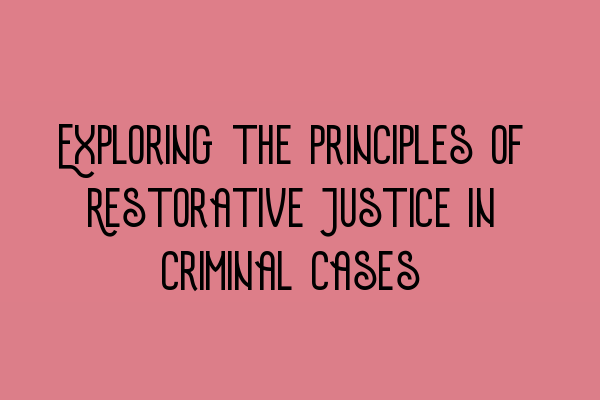Exploring the Principles of Restorative Justice in Criminal Cases
Welcome to the SQE Criminal Law & Practice Law UK blog! In today’s post, we will dive deep into the principles of restorative justice in criminal cases. Restorative justice is an alternative approach to traditional criminal justice systems, aiming to bring healing and resolution to all parties involved in a crime.
The Foundation of Restorative Justice
Restorative justice operates on the belief that crime is not simply a violation of the law but also a conflict between individuals or a community. It emphasizes repairing harm caused by the crime and promoting accountability, while offering an opportunity for the victim, offender, and community to heal and reintegrate.
One crucial aspect of restorative justice is the involvement of all stakeholders in the criminal case. It encourages communication, empathy, and understanding between the victim and the offender. Through dialogue and facilitated mediation, the parties can express their emotions, concerns, and needs, ultimately working towards reconciliation.
Restorative justice also recognizes that community plays a vital role in the aftermath of a crime. It acknowledges that the harm caused by the offense extends beyond the immediate individuals involved and impacts the broader social fabric. Therefore, it seeks to involve the community in addressing and resolving the harm through restorative practices and collective responsibility.
Key Principles of Restorative Justice
Restorative justice is guided by several key principles:
- Voluntariness: Participation in restorative processes must be voluntary for all parties involved, ensuring their willingness to engage and actively participate in the resolution.
- Inclusivity and Equality: Restorative justice promotes inclusivity, recognizing the voices and needs of all participants. It aims to create a safe space for open and respectful dialogue, fostering equality during the process.
- Accountability: Restorative justice emphasizes personal accountability for the harm caused by the crime. Offenders are encouraged to take responsibility, acknowledge their actions, and work towards making amends.
- Reparation: The focus is on repairing the harm caused by the crime and addressing the needs of the victim. This may include financial restitution, community service, or other forms of compensation.
- Empowerment and Support: Restorative justice recognizes the importance of providing support to both victims and offenders throughout the process. It offers opportunities for emotional healing, closure, and personal growth.
Benefits of Restorative Justice
The principles of restorative justice offer several advantages over traditional criminal justice methods:
- Greater victim satisfaction and empowerment, as they have a voice and active participation in the resolution.
- Increased offender accountability and understanding of the consequences of their actions.
- Potential for reduced recidivism rates, as offenders gain insight and empathy through the process.
- Improved community cohesion and resilience, as restorative practices foster social healing and address underlying issues that contribute to crime.
If you are studying for the SQE Criminal Law & Practice Law UK exams, understanding the principles and concepts of restorative justice is crucial. Developing your knowledge in this area will not only enable you to answer examination questions effectively but also equip you with a deeper understanding of the criminal justice system.
By familiarizing yourself with restorative justice, you will gain a comprehensive understanding of this innovative approach to criminal cases. Remember that the SQE Criminal Law & Practice Law UK exams will cover a wide range of topics, so make sure to allocate sufficient time to study each area in depth.
Thank you for reading our blog post today. If you have any questions or would like to learn more about restorative justice or other criminal law topics, feel free to reach out to our team at SQE Criminal Law & Practice Law UK.
